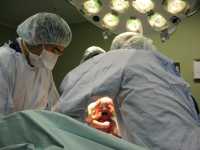Author Interviews, Eating Disorders, OBGYNE / 04.02.2019
Emergency C-Section Raises Depression Risk For New Moms
MedicalResearch.com Interview with:
Valentina Tonei, PhD
British Academy Research Associate
Department of Economics and Related Studies
University of York, UK
MedicalResearch.com: What is the background for this study? What are the main findings?
Response: There has been a growing utilisation of Caesarean sections in the past decades. To put it in a perspective, in the United Kingdom, the caesarean section rate was about 26% in 2015, while in 1990s it was about 12-15%. A similar increase has been observed in other countries, for example in the USA. So, while this study focuses on the United Kingdom, I believe that the evidence from this research can apply also to other countries.
I study the health consequences for mothers who give birth through an emergency caesarean. Thanks to previous studies, we are well-aware of the implications for mothers’ physical health; instead, this research sheds light on the impact on new mothers’ mental health. I find that new mothers who have an emergency caesarean delivery are at higher risk of developing postnatal depression in the first 9 months after the delivery. (more…)



